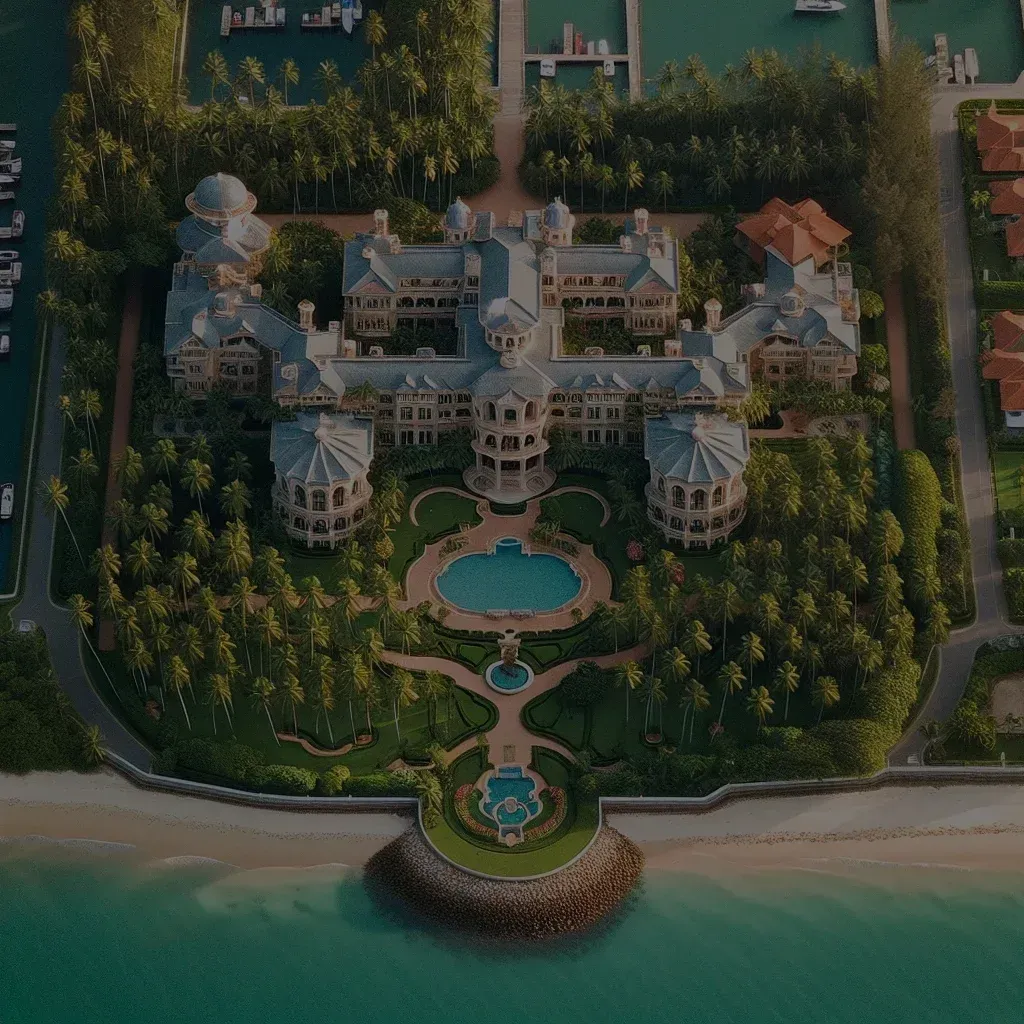Mar-a-Lago, the sprawling estate located in Palm Beach, Florida, has transformed from a luxurious private residence into a focal point of political intrigue and controversy. Initially envisioned as a lavish personal retreat, this grand property has become synonymous with high-stakes political maneuvering, legal challenges, and security debates. As the estate continues to play a pivotal role in America’s political landscape, it has sparked discussions on privacy, accountability, and governance.
The Origins of Mar-a-Lago: From Estate to Epicenter
Mar-a-Lago was originally constructed between 1924 and 1927 by cereal heiress Marjorie Merriweather Post. Designed as a winter retreat, the estate spans 17 acres and encompasses 128 rooms, showcasing the opulence and grandeur of the Roaring Twenties. Post envisioned Mar-a-Lago as a place of refuge and relaxation, a vision she realized through its Mediterranean Revival architecture and lavish interiors. Upon her death in 1973, Post bequeathed the property to the U.S. government, intending it to serve as a winter White House. However, due to high maintenance costs, the government returned the estate to the Post Foundation in 1980.
In 1985, Mar-a-Lago found a new owner in real estate mogul Donald Trump, who purchased the property for $10 million. Trump transformed Mar-a-Lago into a private club while maintaining a private residence within the estate. This shift marked the beginning of its evolution from a private estate to a venue of public interest. The club offered exclusive membership, granting access to luxurious amenities like dining facilities, a spa, and beachfront access, appealing to the wealthy and influential.
The turning point in Mar-a-Lago’s history came with Donald Trump’s presidency. The estate, with its gilded ballrooms and strategic location, became a hub for political meetings and social gatherings. Under Trump’s ownership, Mar-a-Lago morphed into a key site for political discourse and decision-making, blurring the lines between public duty and private interests. This transition set the stage for its emergence as a center of political controversies, drawing both fascination and criticism from the public and media.
Political Power Plays: High-Profile Visits and Meetings
Mar-a-Lago has garnered attention for hosting a series of high-profile political meetings and events. During Trump’s presidency, the estate served as a venue for summit meetings with international leaders, including Japanese Prime Minister Shinzo Abe and Chinese President Xi Jinping. These meetings, often conducted amidst the luxurious backdrop of Mar-a-Lago’s ballrooms, showcased the estate’s dual role as a personal retreat and a stage for diplomatic engagements. The presence of foreign dignitaries highlighted Mar-a-Lago’s significance in global politics, raising questions about the intersection of diplomacy and private interests.
The estate also became a site for Republican fundraising events and strategy sessions. Politicians, donors, and lobbyists frequented the club, leveraging its exclusivity and proximity to power for political gains. These gatherings fueled debates about the influence of wealth in politics and whether such meetings blurred ethical lines. Critics argued that Mar-a-Lago’s role in political fundraising underscored an era of unprecedented access for the elite, potentially compromising democratic principles.
In addition to political figures, Mar-a-Lago attracted celebrities and media personalities, further cementing its status as a cultural and political hotspot. The estate’s social scene, characterized by opulent galas and exclusive parties, often intersected with political maneuvering. This blend of entertainment and politics not only captivated public attention but also intensified scrutiny of the estate’s activities, making Mar-a-Lago a symbol of contemporary political dynamics.
Legal Challenges: Mar-a-Lago and Courtroom Dramas
Mar-a-Lago’s prominence has also made it a focal point of several legal challenges and controversies. The estate’s operations have faced scrutiny over zoning laws and local regulations, leading to legal battles with the town of Palm Beach. Disputes over noise ordinances, construction permits, and environmental concerns have often landed the club in courtroom dramas, reflecting the complexities of maintaining such a high-profile property.
Furthermore, Mar-a-Lago has been at the center of legal controversies involving Donald Trump. While serving as president, Trump faced allegations regarding the mixing of personal and official business at the estate. Critics cited potential violations of the Emoluments Clause, arguing that Trump’s continued ownership and operation of Mar-a-Lago constituted a conflict of interest. These legal debates extended beyond Mar-a-Lago, raising broader questions about presidential ethics and accountability.
In addition, Mar-a-Lago has been linked to various federal investigations, including those involving classified documents and national security concerns. The estate’s role in these investigations has drawn widespread media coverage, further entangling its image with legal challenges. As these legal battles unfold, Mar-a-Lago remains a central point of contention in discussions about transparency, governance, and the legal implications of political power.
Security Concerns: Managing Public and Private Access
With its high-profile guests and sensitive gatherings, Mar-a-Lago presents unique security challenges. The estate’s dual function as a private club and a site for official meetings necessitates stringent security measures to protect both the members and political figures in attendance. The presence of Secret Service personnel, alongside private security, highlights the complexities of safeguarding Mar-a-Lago’s grounds, where private interests meet public responsibilities.
Despite these precautions, security breaches have occasionally occurred at Mar-a-Lago, raising alarms about the adequacy of protective measures. Incidents involving unauthorized access and breaches have sparked debates about the vulnerability of such influential venues. These security lapses underscore the ongoing challenge of balancing access and exclusivity, especially in a place frequented by world leaders and influential political figures.
Moreover, the estate’s location and operations raise concerns about espionage and intelligence gathering. The potential for eavesdropping and surveillance at a site hosting international dignitaries presents a unique set of security risks. Addressing these concerns requires a careful orchestration of security protocols, underscoring the delicate balance between maintaining a prestigious venue and ensuring the safety and confidentiality of its visitors.
Mar-a-Lago’s evolution from a private estate to a center of political controversy encapsulates the complexities of contemporary governance and public life. Its role in high-profile meetings, legal challenges, and security debates reflects broader discussions on power, transparency, and accountability. As Mar-a-Lago continues to influence political discourse, it remains a symbol of the intersection between wealth, politics, and public scrutiny, illustrating the ever-evolving landscape of American politics.
Related Posts:
Related Posts:
- Mar-a-Lago: The Center of Political Controversies
- Exploring ‘Alarmo’: The Future of Home Security Systems
- Unpacking Amazon Prime Day: Deals, Trends, and Impact
Related Posts:
- Mar-a-Lago: The Center of Political Controversies
- Exploring ‘Alarmo’: The Future of Home Security Systems
- Unpacking Amazon Prime Day: Deals, Trends, and Impact
Mar-a-Lago: From Luxurious Retreat to Political Powerhouse and Controversy Hub – Summary Points
Mar-a-Lago: From Luxurious Retreat to Political Powerhouse and Controversy Hub – Summary Points
Related PostRelated PostRelated PostIPTV Services Compared: IPTV Club vs TrexTV vs TrexIPTV – Features and Ratings AnalysisDiscover the Inspirational Power of BoB TV: A Transformative Streaming Experience“Exploring TREX TV: Canada’s Leading IPTV Provider with Extensive Channels and High-Quality Streaming”Relevant LinkRelevant LinkRelevant Link



